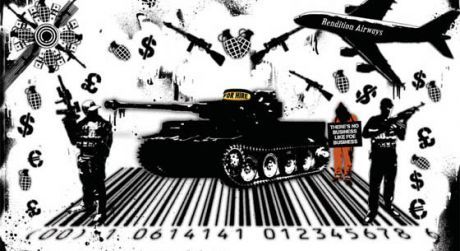Features
You are here
The roots of war

February 12, 2015
Capitalism is a global system of economic competition between rival corporations for profit. The motive for profit is what drives competitive behaviour, the search for new markets, and exploitative practices; corporations exploit labour by forcing down wages, ignoring “externalized” environmental effects, and searching relentlessly for new market niches for their product (or service).
But capitalism is not only a system of economic competition between rival corporations; it is also one of geopolitical competition between states.
Imperialism
Capitalism intertwines both forms of competitions to expand its global reach, to open up new markets, to access cheap raw materials and labour and to distract from issues at home. All of these motivations are for the creation of new capital or to secure existing capital: in the search for and exploitation of resources, the search for new markets, and the search for new territory. The roots of war in a capitalist society are economic.
As Lenin wrote in Imperialism, the Highest Stage of Capitalism, “The capitalists divide the world, not out of any particular malice, but because the degree of concentration which has been reached forces them to adopt this method in order to obtain profits…The epoch of the latest stage of capitalism shows us that certain relations between capitalist associations grow up, based on the economic division of the world; while parallel to and in connection with it, certain relations grow up between political alliances, between states, on the basis of the territorial division of the world, of the struggle for colonies, of the ‘struggle for spheres of influence’.”
Wars benefit capitalist states and their multinational corporations. The international nature of market competition drives the state beyond its boundaries, bringing it into conflict with others states for territory, markets, labour and resources. To stay within your borders is a competitive defeat, whereas military violence is a way to remove barriers to trade and allow corporations to move in. This sort of gun-boat diplomacy is used by states to grant access to their corporations.
It’s an absurdity of capitalism that violent destruction serves as a to boost the economy. Soaring military spending—both during WWII and continuing after—pulled the world out of The Great Depression. Military conflict employs the unemployed and puts millions into the pockets of large weapons manufacturing companies. In this sense war is a useful fiscal tool for governments dealing with unemployment issues and stagnant markets. A fresh war not only lowers unemployment and satisfies armament corporations and private contractors; its destructiveness also creates room for new markets to grow, like the destruction of Europe in WWII.
The post-war boom allowed governments to create welfare states that developed their economies and raised living standards. But with the return to economic crisis governments are imposing austerity while continuing to invest in armies and armaments. The government is even attacking the veterans it sent to fight, and while it claims there’s no money for their pensions there are billions for war. This militaristic drive will intensify in the coming period, as the economic crisis sharpens the competition between global powers.
War at home
Wars are justified through racism that also serves to divide populations at home. Harper has justified his war on Iraq as one against “barbarism,” a xenophobic term used to whip up racism and to distract from the barbarism of the Canadian state.
Harper justified his new anti-terror legislation by echoing George Bush’s post-9/11 justification for war: “They want to harm us because they hate our society and our values. They hate pluralism, they hate tolerance and the freedom we enjoy.” Them versus us. Freedom versus terrorism. This is used to justify a war for economic benefit and to distract from other more troubling domestic issues. The militarization of society is also used to justify repression, as an excuse for surveillance and to curtail civil liberties.
No war, no warming
If we can mobilize our entire economy on short order war that destroys the planet (and sends carbon emissions soaring), why can't we do the same for green energy to preserve the planet on which we depend? Capitalism is willing to wage war against another country to access the “energy security” of dwindling oil reserves, but not invest the same money into sustainable green energy and green jobs.
By connecting opposition to war and climate change, we can oppose the states and the corporations they serve, and imagine a world of peace and climate justice. A world without capitalism and war.
Join the anti-war teach-in this sunday February 15, 1-5pm at Steelworkers Hall, Toronto, organized by the Toronto Coalition to Stop the War
Section:










